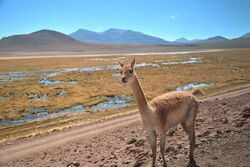Earth:Tropical ecology
Tropical ecology is the study of the relationships between the biotic and abiotic components of the tropics, or the area of the Earth that lies between the Tropic of Cancer and the Tropic of Capricorn (23.4378° N and 23.4378° S, respectively). The tropical climate experiences hot, humid weather and rainfall year-round. While many might associate the region solely with the rainforests, the tropics are home to a wide variety of ecosystems that boast a great wealth of biodiversity, from exotic animal species to seldom-found flora. Tropical ecology began with the work of early English naturalists and eventually saw the establishment of research stations throughout the tropics devoted to exploring and documenting these exotic landscapes. The burgeoning ecological study of the tropics has led to increased conservation education and programs devoted to the climate. This climatic zone offers numerous advantages to ecologists conducting a wide array of studies, from rich biodiversity to vast lands untainted by man.
Origins
The roots of tropical ecology can be traced to the voyages of European naturalists in the late 19th and early 20th centuries. Men who might be considered early ecologists such as Alexander Von Humboldt, Thomas Belt, Henry Walter Bates, and even Charles Darwin sailed to tropical locations and wrote extensively about the exotic flora and fauna they encountered. While many naturalists were simply drawn to the exotic nature of the tropics, some historians argue that the naturalists conducted their studies on tropical islands in order to increase the likelihood that their work might bring about social and political change.[1] In any case, these early explorations and the subsequent writings that came from them comprise much of the early work of tropical ecology and served to spark further interest in the tropics among other naturalists. Henry Walter Bates, for example, wrote extensively about a species of toucan he encountered while traveling along the Amazon River. Bates discovered that if one toucan called out, the other surrounding toucans would mimic his or her call, and the forest would quickly fill with the sounds of toucans; this was one of the first documented studies of animal mimicry.[2] Alexander Von Humboldt voyaged throughout South America, from Venezuela through the Andes Mountains. There, Humboldt and his associate, Aimé Bonpland, stumbled upon an interesting ecological concept. As the pair traveled from the base of the mountains to the peak, they noticed that the species of plants and animals would change according to which climatic zone they were in relative to their elevation. This simple discovery aided the theorization of the life zone concept, which would eventually give way to the popularization of the concept of ecosystems.[2] Another voyager, William Beebe, researched many species of birds in tropical locations and published a large gamut of academic works on his findings that greatly shaped the field of ornithology. According to his biographer Carol Grant Gould, "The effects William Beebe had on science... are enormous and lasting. He made an effective transition between the Victorian natural historian, content to collect and classify the natural world, and the modern experimental biologist."[3] The work of these early pioneers not only lead to an increased interest in the burgeoning field of tropical ecology, but also had far reaching implications for scientific study on the whole.
Conservation and management

Tropical regions are hotspots for biodiversty, so conservation efforts are important to focus on in these places. Many species can be observed and conserved in the tropics.[4] The tropics receive a lot of attention when it comes to conservation and management due to increased public awareness of the significance of tropical ecosystems and the delicacy with which they must be treated. Conservation efforts in the tropics can be difficult to start, as many communities have developed a culture around the ecology in many locations, and in many cases, people make their livelihood off some aspect of the ecology.[5] Conservation measures have multiple benefits to the ecosystem and the community. There are health, economic, and environmental benefits to conserving tropical ecosystems, and conserving these benefits requires communication between local people, governments, and stakeholders. Communication between these groups facilitates the most benefit from conserving tropical ecosystems.[6]
The rainforests are subjects of heightened attention due to the excessive deforestation and logging that occurs in those ecosystems. Deforestation contributes to CO2 emissions, which is a cause of climate change. Much of the deforestation in the tropics is the result of agricultural land use. [7] In the 1980s, the United Nations Food and Agriculture Organization conducted a study that concluded that 15.4 million hectares (100 acres) of tropical forest was lost per year. In addition, 5.6 million hectares were logged each year. This landmark study sparked widespread interest in the tropical ecosystem, and a great number of non-profits and outspoken ecologists engaged in an extended fight to "save the rainforest" that continues today. This battle has manifested itself in a number of ways, one of which is the outcropping of biodiversity institutes in tropical locations dedicated to stopping the excessive deforestation of the landscape, one of the most notable of which was established in Costa Rica. The work of the Costa Rican National Biodiversity Institute (INBio) has served as a model for other biodiversity institutes. First, it must be noted that rainforests harbor the most alkaloid-producing plants of any biome; alkaloids are compounds that are crucial to the production of Western drugs. Due to the abundance of these compounds, pharmaceutical companies all over the world look to the rainforests for new medicinal treatments. In the early 1990s, the heads of INBio signed a deal with the pharmaceutical behemoth Merck that called for cooperation between the two entities in discovering and exploring new natural treatments in the Costa Rican rainforests. Ecologists, government officials, and corporations alike praised this decision as decisive progress in an ongoing struggle to work cooperatively in utilizing tropical biodiversity while ensuring the stability of tropical ecosystems.
Significance of ecology in the tropics

It is advantageous for ecologists and naturalists to study plants, animals, and ecosystems in the tropical climate for a number of reasons. For one, the tropics are home to a wide array of ecosystems, from rainforests to deserts. In that sense, the tropics are a great place for ecologists to conduct diverse studies without traveling too far from a research center. With the large amount of biodiversity present in the tropics, it is a good access point for research. Most research in the tropics has been done on species richness, however more research needs to be done on other aspects of the tropics.[8] Secondly, the temperature in the tropics rarely hinders plant growth and activity; flora can be studied nearly year round, as cold weather never stunts plant activity. In addition to climatic reasons, the traditionally sparse population of the tropics has greatly aided research in the area, as the landscape is largely untainted by mankind and machinery. While this may not be the case so much as of late, the vast amounts of untapped land in the tropics still make for prime research territory. Finally, the tropics are valuable to ecologists because they are home to some of the oldest lands on Earth, including Chile Atacama Desert and Australia Peneplain. Thus, plant communities have been growing and evolving for millions of uninterrupted years, which makes for interesting study. That being said, while it may be advantageous to study ecology in the tropics, this is not to say that it is without difficulty. The ecosystems native to the tropics and the biodiversity they boast are dwindling. Half of the species located in biodiversity hotspots are in danger of extinction, and many of the plants with potential medicinal uses are dying off. In this sense, ecological study in the tropics is not as easily conducted as it once was; this is the reason why much of the modern ecological work in the field is aimed towards conservation and management as opposed to general research.
See also
Notes
- ↑ Grove, Richard (1995). Green Imperialism: Colonial Expansion, Tropical Island Edens and the Origins of Environmentalism, 1600-1860. Cambridge, England: Cambridge University Press. pp. 309–310. ISBN 978-0521565134. https://archive.org/details/greenimperialism00grov.
- ↑ 2.0 2.1 Kricher, John (2011). Tropical Ecology. Princeton, New Jersey: Princeton University Press. pp. 7–10. ISBN 978-0-691-11513-9.
- ↑ Davis Jr., William (December 2005). "The Remarkable Life of William Beebe: Explorer and Naturalist". The Wilson Bulletin 117 (4): 421–422. doi:10.1676/0043-5643(2005)117[0421:ol2.0.co;2].
- ↑ Neudert, Regina; Ganzhorn, Jörg U.; Wätzold, Frank (March 2017). "Global benefits and local costs – The dilemma of tropical forest conservation: A review of the situation in Madagascar" (in en). Environmental Conservation 44 (1): 82–96. doi:10.1017/S0376892916000552. ISSN 0376-8929. https://www.cambridge.org/core/product/identifier/S0376892916000552/type/journal_article.
- ↑ Neudert, Regina; Ganzhorn, Jörg U.; Wätzold, Frank (March 2017). "Global benefits and local costs – The dilemma of tropical forest conservation: A review of the situation in Madagascar" (in en). Environmental Conservation 44 (1): 82–96. doi:10.1017/S0376892916000552. ISSN 0376-8929. https://www.cambridge.org/core/product/identifier/S0376892916000552/type/journal_article.
- ↑ Neudert, Regina; Ganzhorn, Jörg U.; Wätzold, Frank (March 2017). "Global benefits and local costs – The dilemma of tropical forest conservation: A review of the situation in Madagascar" (in en). Environmental Conservation 44 (1): 82–96. doi:10.1017/S0376892916000552. ISSN 0376-8929. https://www.cambridge.org/core/product/identifier/S0376892916000552/type/journal_article.
- ↑ Pendrill, Florence; Persson, U. Martin; Godar, Javier; Kastner, Thomas; Moran, Daniel; Schmidt, Sarah; Wood, Richard (May 2019). "Agricultural and forestry trade drives large share of tropical deforestation emissions" (in en). Global Environmental Change 56: 1–10. doi:10.1016/j.gloenvcha.2019.03.002.
- ↑ Muenchow, Jannes; Dieker, Petra; Kluge, Jürgen; Kessler, Michael; von Wehrden, Henrik (February 2018). "A review of ecological gradient research in the Tropics: identifying research gaps, future directions, and conservation priorities" (in en). Biodiversity and Conservation 27 (2): 273–285. doi:10.1007/s10531-017-1465-y. ISSN 0960-3115. http://link.springer.com/10.1007/s10531-017-1465-y.
External links
- Tropical Biology Association
- Course of Tropical Ecology at Jagiellonian University, Cracow, Poland polish version
- Field Course of Tropical Ecology at Jagiellonian University, Cracow, Poland polish version
- Instituto Venezolano de Investigaciones Cientificas spanish version
